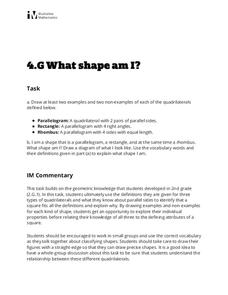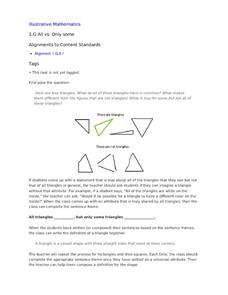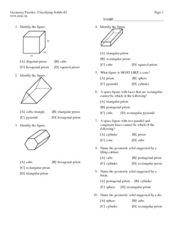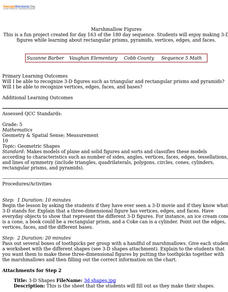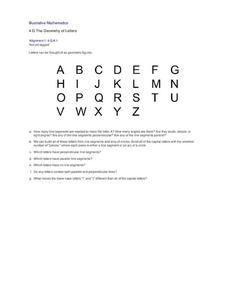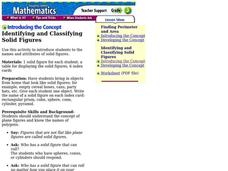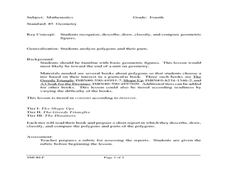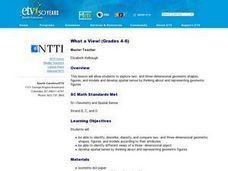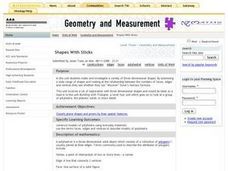Illustrative Mathematics
What Shape Am I?
Sharpen your pencil and grab a ruler, it's time to draw some quadrilaterals! Given the definition of a parallelogram, rectangle, and rhombus, learners draw examples and nonexamples of each figure. The three definitions are...
Illustrative Mathematics
3-D Shape Sort
From the apple on your desk and the coffee cup in your hand, to the cabinets along the classroom wall, basic three-dimensional shapes are found everywhere in the world around us. Introduce young mathematicians to the these common figures...
Curated OER
3-D Figures Part 1
Elementary schoolers explore 3-D shapes. They transition from thinking of shapes as only 2-D. Pupils read Cinderella as a launching activity for their upcoming adventure, and explore a new world of 3-D shapes in this introductory lesson.
Utah Education Network (UEN)
Create, Classify, and Sort Quadrilaterals
Quadrilaterals can be quirky! Fourth graders use geoboards and bands to create four-sided figures. They analyze the attributes such as angle size and presence of parallel sides. As a result they learn to differentiate among...
Curated OER
Exploring Geometric Figures
Tenth graders explore mathematics by participating in hands-on daily activities. Learners identify a list of different shapes and classify them by shape, size, sides and vertices. They utilize tangrams and geometric pieces to gain...
Illustrative Mathematics
All vs. Only Some
All shapes have certain defining attributes that set them apart from others. In order to understand this, young mathematicians look at examples and non-examples of triangles, rectangles, and squares, working as a whole class to create...
Curated OER
What Shapes Can You See?
Students investigate shapes in art. For this visual arts lesson, students examine the ancient Panamanian "Plaque" and identify the geometric shapes in the art piece. Students combine basic shapes to make an artistic picture of their own.
Curated OER
Geometry Practice: Classifying Solids #2
For this solids worksheet, students identify the characteristics of solids. They name solids and determine the number of faces. This three-page worksheet contains seventeen problems. Answers are listed on the last page.
Curated OER
Marshmallow Figures
Students enjoy making 3-D figures while learning about rectangular prisms, pyramids, vertices, edges, and faces. After a lecture/demo, students use marshmallows, toothpicks and a worksheet imbedded in this lesson plan to create 3...
Pennsylvania Department of Education
Shapes Around Us
Learners use manipulatives to study shapes. They sort shapes and use correct geometric terminology to describe them. Students find real-life examples of 2 and 3 dimensional shapes, and classify figures in their classroom according to...
Curated OER
3 dimensional shapes
Students play a bingo game to classify 3 dimensional shapes. In this 3 dimensional shapes lesson plan, students identify, describe, and classify shapes by playing a bingo game.
Curated OER
Geometry and Shapes in the X-36
Young scholars describe, draw, and classify shapes. They use the internet to research the X-36 aircraft. Students identify the geometric shapes in the aircraft. They calculate the number of sides in an x-36.
Curated OER
Shaping Up with Nature at Black Bayou Lake
Young scholars visit a local lake refuge and identify shapes they find in nature. They take pictures of the various shapes and use KidPix to draw shapes around the shapes in the pictures. They watch a slideshow of all the shapes found by...
Curated OER
Classifying Three-Dimensional Shapes
Compare geometric solids based on their properties. Your emergent geometers use spaghetti and marshmallows to build models so they can examine the number of faces, edges, and vertices on polyhedra of their own creation. Resource includes...
Illustrative Mathematics
The Geometry of Letters
Use the alphabet as a tool for teaching your class about geometric figures. Break apart capital letters into line segments and arcs. Classify angles as right, acute, or obtuse. Identify parallel and perpendicular lines. An excellent...
Curated OER
Identifying and Classifying Solid Figures
Students identify and classify solid geometric figures. In this geometry instructional activity, students bring in objects that look like solid shapes and identify their attributes. Students identify the number of surfaces and faces on...
Curated OER
Classifying Geometric Figures
Fourth graders recognize and classify geometric figures. In this geometry lesson, 4th graders read the books Shape Up and The Greedy Triangle and prepare a short report on the shapes mentioned in the text. Students compare the...
Curated OER
Classifying Pyramids
Students study pyramids. For this prisms lesson, students explore the attributes of pyramids. Students will explore the lateral surface area of pyramids and be able to distinguish pyramids from other space shapes.
Curated OER
Connecting Formulas Related to Geometric Figures
Students identify diagrams of quadrilaterals and circles by different names and classify the figures. They name the areas for each diagram and practice solving the formulas for each.
Curated OER
What a View!
Students examine two- and three-dimensional shapes and figures. Individually, they practice identifying the shape from various viewpoints. By completing this activity, they develop a spatial sense about how figures and shapes are...
Curated OER
2-D and 3-D Presents at Pedro's Party
Fifth graders draw 2-D and 3-D shapes. They sketch and label geometric figures with correct terminology, then explore parallel and perpendicular lines. Pupils sort and classify shapes drawn.
Ohio Department of Education
Describing and Creating Plane Figures - Grade One
Young mathematicians draw, create, and describe different shapes using triangles. They discuss attributes of the original and created shapes. Pupils classify the created shapes and draw and write in mathematics journals to communicate...
Illustrative Mathematics
Lines of Symmetry for Quadrilaterals
Explore how lines of symmetry help define different categories of quadrilaterals. Looking at a square, rectangle, trapezoid, and parallelogram, young mathematicians discover that each shape has its own, unique symmetry. Encourage your...
Curated OER
Shapes with Sticks
Third graders investigate three dimensional shapes. They examine a variety of shapes and the relationship between the number of faces, edges, and vertices. Students determine Euler's formula and they create a variety of three dimensional...
